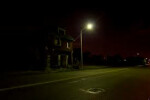Where Does Your Search Lead?

Perhaps it was a TV episode from The Red Skelton Show of my youth. (For those without a clue, Red Skelton was a popular comedian/performer for seventy years and entertained three generations of Americans in film, radio, and television.) It’s the classic comedy routine that begins with a scene that is pitch-black except for a large circle of light coming from a streetlamp. In the spotlight, a man is on his knees, crawling with his hands in front of him, searching for something. After a few moments a beat cop walks into the scene. Seeing the man on all fours, he poses the obvious question, “What’d you lose?”, and the man replies, “I lost my keys.”
The police officer joins the search, and two figures now circle the lighted area on hands and knees. After some time, the officer inquires, “Are you certain this is where you lost your keys? We’ve covered every inch.” “Why, no,” the man replies, pointing to a darkened corner, “I lost them over there.” Frustrated, the policeman exclaims, “Well, then, why in the world are we looking for them over here?”, and the man responds, “The light is better over here!”
This sketch enacts a subtle point. It’s easier to limit our examining of life’s missing keys to easy, comfortable places. Searching dark and difficult corners - where the keys may have, in fact, been lost - is far less desirable.
For me, the current climate (social, political, and religious) proves, again, that we live in a world awash in cynicism. It seems we are coaxed by all facets of the media to examine the flaws of everyone, to search for the scandal in every story, and to pour over everything that divides us, offends us, or otherwise differs from us in any way.
But, more than this, we are encouraged to criticize, regardless of whether we know anything about the subject whatsoever. The comment section of online news stories invites readers to put their own responses in writing. And, comment they do! For many (most?), it simply offers pointless ground for anonymous and inflammatory heckling. We’re even invited to comment on these comments, to judge whether the commenters themselves need to be critiqued.
This is where the man in the sketch seems so familiar. How easy is it to search where the light is strong, to examine transgressions of others as if it were the best way to spend our time? As the glare shines on an individual or the latest gossip draws our attention like bugs to a porch light, how easy is it to declare this spot the place we will fully scrutinize? How readily do we prefer to be critics of those in the spotlight rather than fumble over our own flaws in dark recesses?
In our Christian walk, it is helpful to know that Jesus was aware just how tempted we are to take the easier option. “Why do you see the speck that is in your brother's eye, but do not notice the log that is in your own eye? …you hypocrite, first take the log out of your own eye, and then you will see clearly to take the speck from your brother’s eye.” (Matthew 7.3-5) The flaws seen in others seem so clear to us and our criticism so warranted. However, might there not be a better place to spend our energy searching? Maybe we are looking where the light is, but not where keys are really lost.
“A scoffer seeks wisdom in vain, but knowledge is easy for a man of understanding.” (Proverbs 14.6) Perhaps this is true because the scoffer spends his time searching the comfortable places of life, the easy targets where the spotlight and company will always be found. The difficult, dimly lit places require much more of us, and, perhaps, we are left to search on our own. But, the discerning ones know that wisdom comes with the kind of searching which pulls us thoughtfully inward, into places where there is actually something to find, and before a merciful God that compels transparency.


Comments
Login/Register to leave a comment